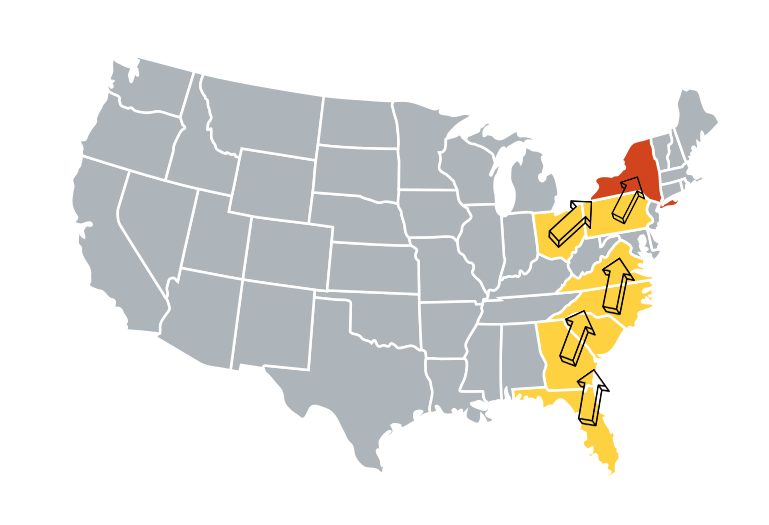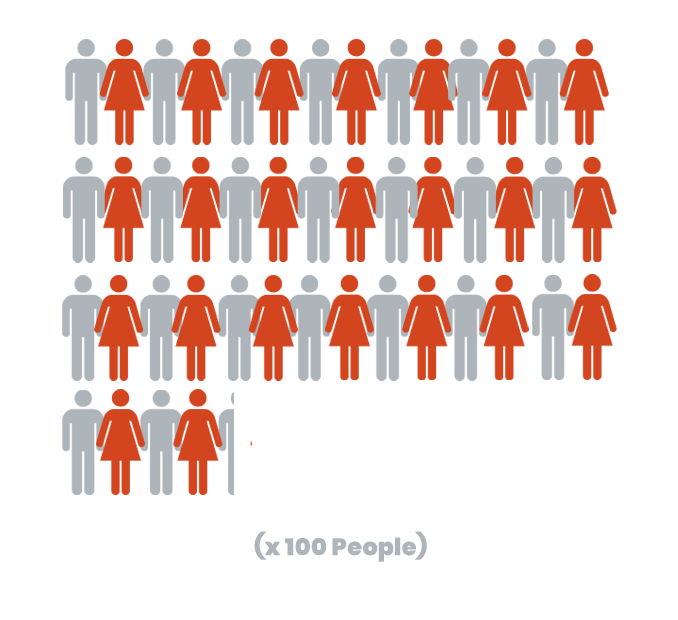NY State Gun Laws
New York State currently has some of the strongest gun laws in the United States – that’s why we have the second-lowest firearm death rate in the country.
New York State law requires firearms dealers to run a background check through the National Instant Criminal Background Check System (NICS) for any transfer, sale, exchange, or disposal of a firearm, except between immediate family members. These requirements include but are not limited to private sales, sales at gun shows, and to online firearm sellers. Once the NICS background check is performed, the dealer must send a report to the state. To learn more about New York’s background check system and licensing requirements see N.Y. Penal Law § 400 and N.Y. Penal Law § 265.
The manufacture, transport, sale, transfer or disposing or possessing of an assault weapon is prohibited by New York State law.
An “assault weapon” is defined as a semi-automatic rifle that has an ability to accept a detachable magazine and has a least one of numerous features or characteristics including but not limited to: a folding or telescope stock; a pistol grip that protrudes conspicuously beneath the action of the weapon; a thumbhole stock; a second handgrip or a protruding grip that can be held by the non-trigger hand; a bayonet mount; a flash suppressor, muzzle break, muzzle compensator, or a threaded barrel designed to accommodate a flash suppressor, muzzle break, or muzzle compensator, or a grenade launcher. For a comprehensive list of all firearms that are covered by New York’s assault weapons ban law see N.Y. Penal Law § 265.00 (22); see also N.Y. Penal Law § 400.00 (16-a).
Although New York law does not require guns to be safely stored in all circumstances, New York’s strong safe storage law requires a gun to be locked in a “safe storage depository” if the gun owner:
- lives with a child who is under sixteen years old; or
- knows or has reason to know that a person under sixteen is likely to access the gun; or
- knows or has reason to know that a person the owner lives with is prohibited from possessing a gun because they have a felony conviction, a mental health adjudication or commitment, a conviction for a serious misdemeanor, or because of an extreme risk protection order or other protective order.
A “safe storage depository” is defined as a container that is incapable of being unlocked without a key or combination lock, or use of a trigger lock when not carried or under the immediate possession or control of the gun owner. To learn more about NY’s safe storage requirements as they apply to gun dealers and gun owners see NY General Business Law § 396-ee; see also NY Penal Law § 265.45.
Gun owners, firearms dealers, or any other person in lawful possession of a firearm or ammunition are required to report the loss or theft of guns or ammunition to the police or sheriff’s office within 24 hours. See N.Y. Penal Law § 400.10.
If a “Mental Health Professional” determines that a person they are treating is “likely to engage in conduct that would result in serious harm to self or others,” the mental health provider must report the patient’s name (or other identifying information that does not disclose private medical information), to the New York State Director of Community Services. This report must then be submitted to the New York State Department of Criminal Justice Services for the sole and exclusive purpose of determining whether the identified person is prohibited from possessing a gun under New York State or federal law. For more information about New York’s law addressing guns and mental health see N.Y. Mental Hyg. Law §§ 9.4644; see also https://nics.ny.gov/docs/guidance.pdf.
New York’s Extreme Risk Protection Order (ERPO) is a civil court-issued order that prohibits people found to be dangerous to themselves or others from temporarily purchasing or possessing a firearm, rifle, or shotgun. ERPOs can be used to prevent mass shootings, suicides, domestic violence, and interpersonal gun violence.
Who can petition for an ERPO?
- Police Officer or District Attorney
- Family or Household Member School Administrator
- School Designee: Anyone chosen by the school to start a case, like teachers, guidance counselors, school psychologists, school nurses, and coaches.
Where is an ERPO petition filed?
File the ERPO petition with the NYS Supreme Court in the county where the allegedly dangerous individual (the “respondent”) lives. To locate the appropriate court go to the NY courts website.
What behavior may warrant the issuance of an ERPO?
- Threat or act of violence or use of physical force directed toward self or another person
- Violation or alleged violation of an Order of Protection
- Pending charge or conviction for an offense involving use of a weapon
- Reckless use, display or brandishing of a gun
- Prior violation of an ERPO
- Recent or ongoing abuse of controlled substances or alcohol
- Evidence of recent acquisition of a gun or another deadly weapon, dangerous instrument, or ammunition
- Other behavior indicating that the individual is likely to harm self or others
- Timing: Did the behavior happen within 6 months of the time of the application?
What happens after the final ERPO expires?
- Return guns to lawful owner
- Return guns to respondent
For more information about NY’s ERPO process see fact sheet from NYAGV and the Educational Fund to Stop Gun Violence; see also NYS courts website.
“Undetectable” firearms are banned in New York State. That includes firearms that can’t be detected by a metal detector after removing the grip, stock, and magazine and that have a barrel, slide, or cylinder, frame, or receiver that cannot be imaged by security screening devices (e.g. airport security detectors) See N.Y. Penal Law § 265.50; see also § 265.55.
Notably, though New York State passed this law prohibiting undetectable “ghost” guns in 2019, New York State does not currently prohibit untraceable guns–ghost guns that have not been serialized. See NYAGV’s 2021 State Advocacy Priorities for actions you can take to ban untraceable ghost guns in New York.
Under New York State law anyone convicted of a felony or “serious offense” is prohibited from acquiring a pistol permit, or from purchasing rifles or shotguns. “Serious offenses” include several domestic violence misdemeanors–offenses that are committed against a member of the same family or household–including but not limited to assault, menacing, strangulation, trespassing, and harassment. See N.Y. Crim. Proc. Law § 370.15.
Access to a gun is a serious threat to the safety of domestic violence victims. New York State domestic violence-related laws provide for permissive or mandatory suspension or revocation of a firearm license depending upon the circumstances of the domestic violence incident. The court hearing the domestic violence case evaluates the facts and will make an immediate decision as to whether to suspend or revoke the domestic violence offender’s license. For more information on domestic violence protection orders and how the temporary or final order of protection process works in New York’s family or criminal courts see N.Y. Crim. Proc. Law §530.14 and Family Court Act §842-a; see also N.Y. Penal Law §400.00 et seq.
Under New York State law, a law enforcement officer may, when responding to a report of a domestic violence offense, take temporary custody of any firearm (and any firearm license) on the premises that is in plain sight or discovered pursuant to a consensual or lawful search. The gun owner or person in possession of the gun will be given a receipt by the responding officer describing the weapons and/or license and the firearm’s identification or serial number as well as the process and location for recovery. The gun owner will be entitled to recover his or her firearm within 48 hours if there is no order of protection or extreme risk protection order issued. For more information see N.Y. Crim. Pro. § 140.10.
NY STATE GUN VIOLENCE STATISTICS
Learn more about gun violence in New York State
New York has the second-lowest gun death rate in the country, thanks to its strong gun laws - 3.9 deaths per 100,000.
Gun violence spiked in cities throughout New York in 2020. Statewide, there was a 75 percent increase in shootings and an 82 percent increase in gun-related homicides.
As of late March 2021, shootings in NYC were up 40% from 2020.
In 2020, there were 1,531 shooting incidents in NYC, and 1,868 shooting victims in NYC - more than 2018 and 2019 combined.

74% of crime guns recovered in NY State come from out of state.
Approximately 65% of NY state’s gun homicide victims are Black, but only 15% of NY state’s population is Black.

